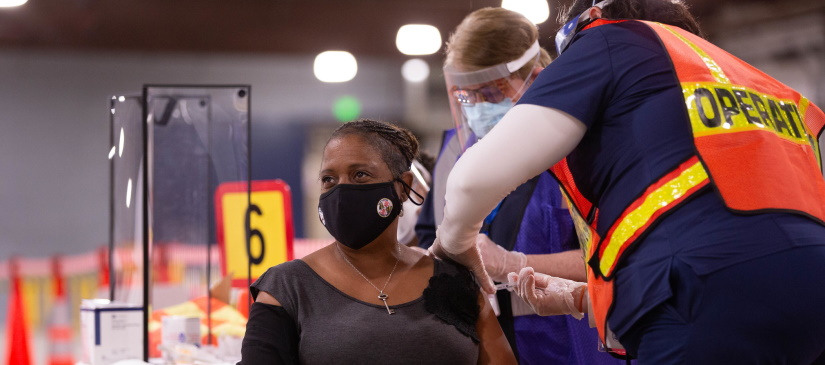June 16, 2021 | Erin Bluvas, bluvase@sc.edu
With nearly 500,000 confirmed cases and more than 8,500 deaths as of June 15, 2021, South Carolina has experienced a significant impact from the COVID-19 pandemic and ranks 40th among states in the percentage of the population that has been fully vaccinated (35.7 percent as of June 15, 2021). Existing health disparities, including socioeconomic vulnerability and lack of access to healthcare resources, have exacerbated infection rates and posed additional challenges to COVID-19 vaccine uptake among underserved populations, such as non-Hispanic Blacks.
“High uptake of the COVID-19 vaccine is among the most promising strategies to reduce the burden of disease and control the pandemic,” says Sara Wilcox, professor of exercise science and director of the UofSC Prevention Research Center.
“Unfortunately, misconceptions of the vaccine, mistrust in the health system, and
lack of access to health services may impede confidence in the vaccine and ultimately
uptake, particularly among underserved communities disproportionately affected by
COVID-19,” adds Shan Qiao, associate professor of health promotion, education, and behavior and director of a new project aimed at increasing vaccination rates among vulnerable
populations.
Promoting confidence in vaccines and increasing uptake in underserved communities requires listening, understanding, and collaboration to modify service delivery and address socioeconomic barriers.
-Shan Qiao, associate professor of health promotion, education, and behavior
Funded by the Centers for Disease Control and Prevention since 1993, the UofSC Prevention Research Center is among 26 academic institutions in 20 states that conducts public health prevention research. The Center, and many of its counterparts, recently received an additional $500,000 each to increase vaccination uptake in underserved communities.
With this funding, Center investigators will partner with the South Carolina Department of Health and Environmental Control (SC DHEC) to empower several community-based organizations (South Carolina Community Health Worker Association, CAN Community Health, Palmetto AIDS Life Support Services) in promoting confidence in and access to COVID-19 vaccines among non-Hispanic Black populations. The South Carolina Community Health Worker Association is a community-based organization made up of community health workers and supporters in South Carolina with aims to provide a forum for networking, sharing of strategies and resources as well as provide a foundation for education and training of community health workers. CAN Community Health and Palmetto AIDS Life Support Services are AIDS service organizations that are part of a collaborative network funded by the Ryan White HIV/AIDS Program via SC DHEC.
The project will begin by engaging community stakeholders (e.g., clinical leaders at local community-based organizations) to identify socio-behavioral drivers of vaccine uptake and the facilitators/barriers experienced by underserved communities. They will then recruit and train peer advocates to share correct information about the vaccines and professional navigators to address infrastructural barriers (e.g., transportation, appointment availability, health insurance). The efforts of this multi-level vaccine promotion intervention/health communication campaign will be assessed by the team and reported to the CDC’s COVID-19 Vaccinate with Confidence Strategy to share best practices and lessons learned.
“Promoting confidence in vaccines and increasing uptake in underserved communities requires listening, understanding, and collaboration to modify service delivery and address socioeconomic barriers,” Qiao says. “Empowering an existing primary healthcare network, with established community relationships and led by local healthcare workers, could play a significant role in serving as a bridge between the Black communities and the local health system and accelerating COVID-19 vaccine uptake.”
*Co-investigators include Sara Wilcox (Exercise Science), Shan Qiao (Health Promotion, Education, and Behavior), Bankole Olatosi (Health Services Policy and Management), Xiaoming Li (Health Promotion, Education, and Behavior), Brooke McKeever (Journalism and Mass Communication), Ali Mansaray (SC DHEC STD/HIV & Viral Hepatitis), Cheryl Scott (SC DHEC Community Health Services & Health Equity).
Related:
Prevention Research Center awarded CDC funding to re-up for another five years
